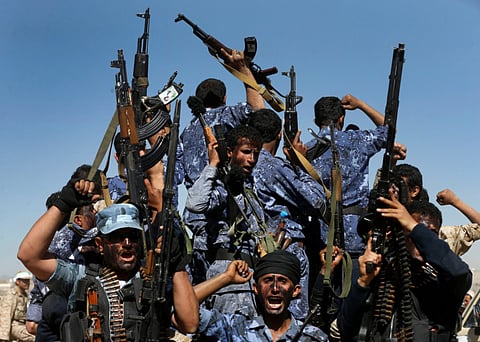Iran denies interference in Arab affairs. Evidence says otherwise
Tehran is actively pursuing classic power politics in Yemen as well as Iraq, Syria, Lebanon, Bahrain and elsewhere to impose its will and strategic interests

Vexed by the League of Arab States (LAS) declaration that Iran interferes in Arab affairs, Bahram Qassemi, a spokesperson for the Iranian Ministry of Foreign Affairs, strongly denied any meddling and dismissed as “baseless and hackneyed claims by the Arab League foreign ministers about the ownership of the three Iranian islands of the Greater Tunb, Lesser Tunb and Abu Musa in the Persian [Arabian] Gulf”.
In a moment of sheer hubris, Qassemi affirmed that “Iran’s sovereignty over these islands is an undeniable and eternal reality”, yet another illustration of putative divine privileges passing for foreign policy planks.
Inasmuch as the Iranian spokesperson’s statement was not the first time such prose filled the airwaves and flooded print outlets, it was fair to ask what was it that Iran wanted in the Arabian Gulf and how it intended to live with, presumably, its Arab Gulf neighbours?
First, the festering dispute over the occupied UAE islands, which Qassemi reminded everyone, the LAS heads of states “can never undermine Iran’s sovereignty over the three islands”.
No matter how unpalatable the notion may be in Tehran, the fact of the matter is that the occupied UAE islands of Abu Musa and the Greater and Lesser Tunbs were invaded on November 30, 1971 after British forces withdrew from the islands, just a day before the UAE gained its independence from Britain. At the very least, there should be no qualms about the fact that Iranian marines occupied the islands, even if the territorial disputes lingered.
Historical background
The islands were part of the Kingdom of Hormuz, established by Arab princes in the 10th century, and while that monarchy came under Persian suzerainty in 1262 before, in turn, it became part of the Portuguese empire, there is no denying that they started out as Arab territory.
There were, to be sure, various memoranda signed by a number of shaikhs, but the occupied UAE islands of Abu Musa and the Greater and Lesser Tunbs were and are Arab and belong to the UAE, whose leaders proposed to go to the International Court of Justice (ICJ) for a final adjudication. Iran refuses.
Second, the intrepid Iranian spokesperson further rejected as groundless all of the claims made by several Arab leaders in their pronouncements that the Islamic Republic of Iran openly interfered in the internal affairs of Arab countries, saying that Tehran “never interfered in the internal affairs of any country and feels no need at all for such interference”, which must also be challenged. He added his deep sorrow as several Arab and Muslim leaders, “either intentionally or by mistake... go astray and fail to distinguish friend from foe”, allegedly because they point the finger at Iran instead of “dealing with the most important crises in the region”. As is customary for Iranian officials, Qassemi regretted “that some are trying to change reality and replace the Zionist regime [Israel] with Islamic Iran as an illusory and fabricated enemy”.
In fact, and lest the fearless Qassemi may have forgotten, it was Ali Akbar Velayati, a former Iranian minister of foreign affairs and an adviser on international affairs to Supreme Leader Ali Khamenei — as well as the president of the Expediency Council’s Centre for Strategic Research — who told a group of Yemeni clerics gathered in Tehran in October 2014 that “The Islamic Republic of Iran supports the rightful struggles of Ansar Allah [Al Houthis] and considers this movement as part of the successful materialisation of the Islamic Awakening [the name Iran uses for the Arab Uprisings] movements”.
Velayati boasted of Al Houthi victories in Yemen, which came to naught after the Kingdom of Saudi Arabia led a coalition to restore the legitimately elected president in Sana’a, even if the war is now in its third year. Velayati and his colleagues may be sure of an Al Houthi triumph in Yemen, though there is little to back that presumption, except that Tehran successfully managed to empower Al Houthis to play the same role that Hezbollah plays in Lebanon.
Of course, the far more objective Ali Riza Zakani, a member of the Majlis (Iranian parliament) who is also a close confidant of Iran’s Supreme Leader Khamenei, must receive his dues for boasting that “three Arab capitals [Beirut, Damascus, and Baghdad] have already fallen into Iran’s hands and belong to the Iranian Islamic Revolution”, before adding that the fourth capital to join the fray was Sana’a.
Bahram Qassemi may not have seen the Zakani memo that affirmed that Iran is now at a stage of “Grand Jihad” [one of the outcomes of the Arab Uprisings] and must carefully calibrate its foreign policy accordingly.
Iran’s functionaries, he proclaimed as early as 2014 — that is when the Arab Spring was still in its infancy — must all be informed of key regional developments, how Tehran can influence the course of events and, most importantly, help “the oppressed peoples in the Middle East”.
For Zakani, this is not interference but a sign of humanitarian assistance that, in reality, is little more than exporting its own revolution to the Arab world.
There is no denying that Iran is actively pursuing classic power politics in Yemen, as well as in Iraq, Syria, Lebanon, Bahrain and elsewhere to impose its will and strategic interests, just like there is no reason to doubt that Arab states reject such interferences.
For Iran to play this disavowal game is unbecoming. It’s time for its leaders to accept responsibility and understand that the Arab world, for lack of a better word, will not submit.
Dr Joseph Kechichian is the author of the just published The Attempt to Uproot Sunni Arab Influence: A Geo-Strategic Analysis of the Western, Israeli and Iranian Quest for Domination (Sussex: 2017).


